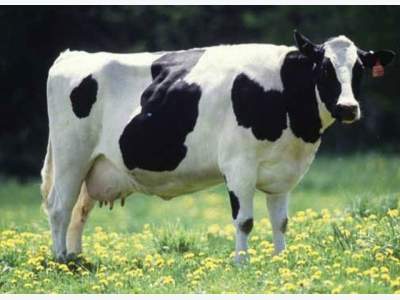Getting better handle on methane emissions from livestock

Current estimates of total livestock methane emissions may rely on outdated factors while not fully considering feed intake or manure storage facilities.
Cattle, swine and poultry contribute a hefty portion to the average American’s diet, but raising these livestock comes at a cost to the environment: The industry produces a lot of methane, a potent greenhouse gas. Just how much gas the animals release, however, is the subject of debate.
One group recently reported in the American Chemical Society's (ACS) Environmental Science & Technology journal that a new approach could shed light on how accurate the current data are.
According to the U.S. Environmental Protection Agency, the livestock industry is the second-biggest methane emitter in the U.S., ACS noted. The gas comes from the microbial fermentation that occurs in the animals’ stomachs, resulting in digestion-related (enteric) emissions, and from fermentation in their manure. The total amount depends on the type of animal, what the animals eat and how their manure is stored.
For example, cattle that mostly consume grain-based feed release significantly less enteric methane than cattle that graze on pasture. However, current estimates of total livestock methane emissions may rely on outdated emission factors and do not fully consider feed intake and differences in animal diets or the facilities used to store manure.
These data gaps lead to large uncertainties in methane emission figures. To better understand livestock contributions to these emissions in the U.S., Alexander Hristov and colleagues at The Pennsylvania State University sought to fill in the missing data gaps.
The team analyzed the feed intake data for cattle as well as manure storage practices for cattle, pigs and poultry at the county and state levels in the contiguous U.S. Their resulting estimates for methane emissions by location varied widely from numbers currently reported by inventories such as the European Emission Database for Global Atmospheric Research (EDGAR), ACS noted.
For example, the researchers found that the combined enteric and manure methane emissions from livestock in Texas and California were 36% less and 100% greater, respectively, than estimates by EDGAR. Based on their data, the researchers said results from studies that use inaccurate distribution inventories to determine emission sources should be interpreted with caution.
The authors acknowledged partial funding from ExxonMobil Research & Engineering Co.
The abstract and an open-access article that accompanied this study are available here.
ACS, the world’s largest scientific society, is a not-for-profit organization chartered by the U.S. Congress. ACS is a leader in providing access to chemistry-related information and research through its multiple databases, peer-reviewed journals and scientific conferences.
Related news
 VietGAP farming standards help improve orange cultivation in Ha Giang
VietGAP farming standards help improve orange cultivation in Ha Giang The model has inspired local households to set up VietGAP orange growing teams, create a brand, increase productivity, quality, and profitability
 Three factors make Vietnamese cassava slump in China
Three factors make Vietnamese cassava slump in China Although China is still the largest exporter of cassava and cassava products from Vietnam, the export of this commodity to China has been declining sharply
 Moc Chau people grow passion fruit for export
Moc Chau people grow passion fruit for export Over the past two years, passion fruit has proven profitable to the farmers of Moc Chau district, Son La province.
 Flower farmers prepare for Tết holiday market
Flower farmers prepare for Tết holiday market Flower growers are busy preparing for the upcoming Tết (Lunar New Year) which will begin on February 5.
 Gardeners busy with preparing vegetable supply for Tet
Gardeners busy with preparing vegetable supply for Tet When the traditional Tet holiday is around the corner, farmers in Phu Long’s vegetable villages -Ham Thuan Bac district are busy with sowing, planting